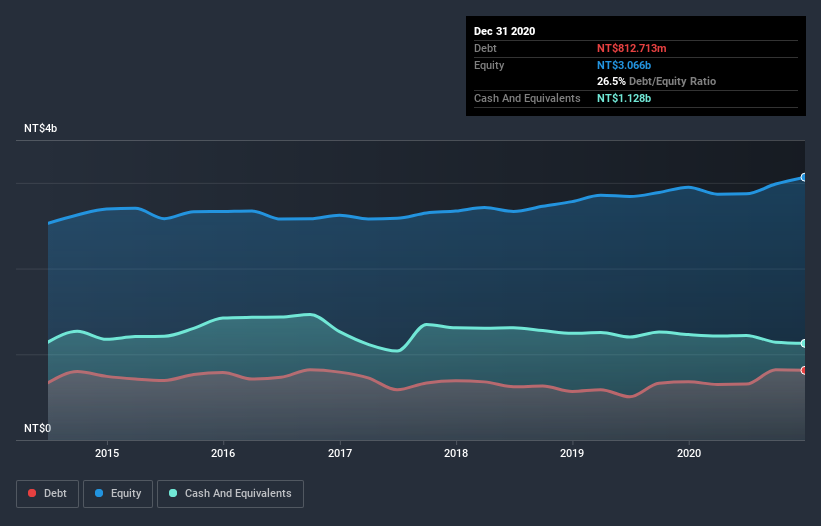- Taiwan
- /
- Electronic Equipment and Components
- /
- TPEX:8182
Here's Why Harmony Electronics (GTSM:8182) Can Manage Its Debt Responsibly
Howard Marks put it nicely when he said that, rather than worrying about share price volatility, 'The possibility of permanent loss is the risk I worry about... and every practical investor I know worries about.' It's only natural to consider a company's balance sheet when you examine how risky it is, since debt is often involved when a business collapses. We note that Harmony Electronics Co. Ltd (GTSM:8182) does have debt on its balance sheet. But the real question is whether this debt is making the company risky.
What Risk Does Debt Bring?
Generally speaking, debt only becomes a real problem when a company can't easily pay it off, either by raising capital or with its own cash flow. In the worst case scenario, a company can go bankrupt if it cannot pay its creditors. However, a more usual (but still expensive) situation is where a company must dilute shareholders at a cheap share price simply to get debt under control. Of course, plenty of companies use debt to fund growth, without any negative consequences. When we examine debt levels, we first consider both cash and debt levels, together.
See our latest analysis for Harmony Electronics
How Much Debt Does Harmony Electronics Carry?
You can click the graphic below for the historical numbers, but it shows that as of December 2020 Harmony Electronics had NT$812.7m of debt, an increase on NT$678.3m, over one year. But it also has NT$1.13b in cash to offset that, meaning it has NT$315.1m net cash.

How Strong Is Harmony Electronics' Balance Sheet?
According to the last reported balance sheet, Harmony Electronics had liabilities of NT$1.30b due within 12 months, and liabilities of NT$532.5m due beyond 12 months. Offsetting this, it had NT$1.13b in cash and NT$821.5m in receivables that were due within 12 months. So it can boast NT$121.4m more liquid assets than total liabilities.
This surplus suggests that Harmony Electronics has a conservative balance sheet, and could probably eliminate its debt without much difficulty. Succinctly put, Harmony Electronics boasts net cash, so it's fair to say it does not have a heavy debt load!
In addition to that, we're happy to report that Harmony Electronics has boosted its EBIT by 86%, thus reducing the spectre of future debt repayments. When analysing debt levels, the balance sheet is the obvious place to start. But you can't view debt in total isolation; since Harmony Electronics will need earnings to service that debt. So when considering debt, it's definitely worth looking at the earnings trend. Click here for an interactive snapshot.
Finally, a company can only pay off debt with cold hard cash, not accounting profits. Harmony Electronics may have net cash on the balance sheet, but it is still interesting to look at how well the business converts its earnings before interest and tax (EBIT) to free cash flow, because that will influence both its need for, and its capacity to manage debt. In the last three years, Harmony Electronics created free cash flow amounting to 5.8% of its EBIT, an uninspiring performance. That limp level of cash conversion undermines its ability to manage and pay down debt.
Summing up
While it is always sensible to investigate a company's debt, in this case Harmony Electronics has NT$315.1m in net cash and a decent-looking balance sheet. And we liked the look of last year's 86% year-on-year EBIT growth. So we don't think Harmony Electronics's use of debt is risky. The balance sheet is clearly the area to focus on when you are analysing debt. But ultimately, every company can contain risks that exist outside of the balance sheet. These risks can be hard to spot. Every company has them, and we've spotted 2 warning signs for Harmony Electronics you should know about.
When all is said and done, sometimes its easier to focus on companies that don't even need debt. Readers can access a list of growth stocks with zero net debt 100% free, right now.
When trading Harmony Electronics or any other investment, use the platform considered by many to be the Professional's Gateway to the Worlds Market, Interactive Brokers. You get the lowest-cost* trading on stocks, options, futures, forex, bonds and funds worldwide from a single integrated account. Promoted
Valuation is complex, but we're here to simplify it.
Discover if Harmony Electronics might be undervalued or overvalued with our detailed analysis, featuring fair value estimates, potential risks, dividends, insider trades, and its financial condition.
Access Free AnalysisThis article by Simply Wall St is general in nature. It does not constitute a recommendation to buy or sell any stock, and does not take account of your objectives, or your financial situation. We aim to bring you long-term focused analysis driven by fundamental data. Note that our analysis may not factor in the latest price-sensitive company announcements or qualitative material. Simply Wall St has no position in any stocks mentioned.
*Interactive Brokers Rated Lowest Cost Broker by StockBrokers.com Annual Online Review 2020
Have feedback on this article? Concerned about the content? Get in touch with us directly. Alternatively, email editorial-team (at) simplywallst.com.
About TPEX:8182
Harmony Electronics
Manufactures and sells of quartz crystal products in Taiwan, Thailand, and China.
Adequate balance sheet with slight risk.
Similar Companies
Market Insights
Weekly Picks


Crazy Undervalued 42 Baggers Silver Play (Active & Running Mine)


Fiducian: Compliance Clouds or Value Opportunity?

Willamette Valley Vineyards (WVVI): Not-So-Great Value
Recently Updated Narratives

Watch Pulse Seismic Outperform with 13.6% Revenue Growth in the Coming Years

Significantly undervalued gold explorer in Timmins, finally getting traction

Moderation and Stabilisation: HOLD: Fair Price based on a 4-year Cycle is $12.08
Popular Narratives


MicroVision will explode future revenue by 380.37% with a vision towards success


NVDA: Expanding AI Demand Will Drive Major Data Center Investments Through 2026





